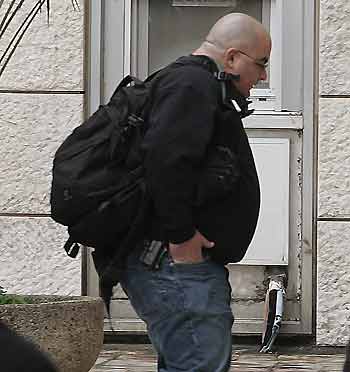|
Israel back to politics as Sharon's condition improves
(AP)
Updated: 2006-01-12 09:21
Israel returned to politics while Prime Minister Ariel Sharon was improving
but still comatose in a hospital a week after a massive stroke, with his allies
jockeying for position and his main rival ordering his party's ministers to quit
the Cabinet.
Likud members were to vote Thursday in primary elections to choose a list of
candidates for March 28 elections, with polls showing them losing more than half
their strength from last time _ when Sharon was their leader. The same polls
show Sharon's new party, Kadima, maintaining a huge lead despite, or perhaps
because of, his illness.
Sharon's successor as Likud leader, ex-premier Benjamin Netanyahu, ordered
his party's Cabinet ministers to quit on Thursday. But Israeli media reported
that the four ministers would ignore the order, plunging the hard-line movement,
already reeling from Sharon's defection, into further disarray.

Omri Sharon, son of ailing Israeli Prime
Minister Ariel Sharon, arrives at Hadassah hospital in Jerusalem January
11, 2006. Israeli Prime Minister Ariel Sharon's life is no longer in
immediate danger and he has shown further signs of recovery from a massive
stroke, but it could be days until the extent of brain damage is known,
doctors said. [Reuters] | Uncertainty over
Sharon's condition clouded Kadima campaign plans. Doctors said it would be days,
perhaps weeks, before a full picture of the damage from Sharon's stroke would be
clear. He showed slight progress on Wednesday, but his doctors warned that
neurological cases are slow to develop, measuring progress in weeks and months.
Sharon's closest ally, Ehud Olmert, has taken over as acting prime minister,
but if Sharon is ruled permanently incapacitated, the Cabinet would have to pick
a replacement until the election _ probably Olmert.
Since Sharon's stroke, Olmert has worked to project an air of stability,
holding Cabinet meetings and assuring the country that the government was
continuing to function. He spoke with Russian Foreign Minister Sergey Lavrov on
Wednesday and gave him an update on Sharon's condition.
Olmert had previously been seen as an unlikely candidate for prime minister,
but his calm stewardship of the crisis has turned him into the clear
front-runner in the election.

An Israeli security guard stands in front of the entrance to
the emergency room at the Hadassah Ein Karem hospital, where Israeli Prime
Minister Ariel Sharon is being treated in Jerusalem early January 11,
2006. [Reuters] | A poll for Channel 10 TV and the Haaretz daily projected that an
Olmert-headed Kadima would win 44 of 120 seats, virtually assuring it would lead
the next government. Likud and the dovish Labor trailed with about 15 seats
each. Pollsters questioned 640 voters but did not give a margin of error.
Kadima politicians cautioned against reading too much into the poll. "We know
about the limitations of these polls," Kadima lawmaker Haim Ramon told Israel
TV. "This just says that it depends on what we do. This week we acted well."
Experts said the results might reflect sympathy for Sharon's plight and might
not hold.
Sharon formed the party late last year, bolting Likud after many of its
lawmakers tried to torpedo his plan to withdraw from the Gaza Strip. Though many
experienced politicians joined the centrist Kadima, it was largely seen as a
one-man show. Sharon had not yet drawn up the party's election list _ a
difficult and often divisive process _ when he suffered his stroke.
On Wednesday, some Kadima officials discussed running Sharon symbolically in
the top position on the list, but making Olmert their candidate for prime
minister.
"Let's say that (Sharon) has serious physical limitations, but in all other
capacities he functions. There is no one better than him for the first place,"
Ramon said.
Tourism Minister Abraham Hirchson, also of Kadima, said the party should wait
to see Sharon's condition before making a decision.
Opposition politicians criticized the idea.
"I don't think that at the moment Sharon should be seen as some kind of
electoral asset to be used by Kadima or anyone else," Likud lawmaker Yuval
Steinitz told Israel TV, dismissing the idea as "inappropriate."
Other politicians appeared to accept that Olmert would take Sharon's place as
leader of the party.
"I'm waiting for Ehud Olmert to come out and say what exactly the Sharon
tradition means to him," Labor lawmaker Yuli Tamir said. "Then we can have a
proper political debate."
Sharon's doctors said Wednesday that his condition had improved slightly, and
they were trying to wean him off the sedatives that kept him in an induced coma.
Dr. Yoram Weiss, one of Sharon's doctors, told Israel's Channel 2 TV that
after the sedatives are stopped, it would take several days to determine the
extent of his brain damage.
"We're talking about a long, slow and drawn-out process and we hope that it
will always develop positively. It's very hard to say what the pace will be," he
said.
One of his neurosurgeons, Jose Cohen, said most patients open their eyes
within three weeks after sedation and the sooner this happens, the better.
However, Sharon was certain to have sustained some cognitive damage, he said.
"There will be changes, but what changes, nobody knows," Cohen told Israel
TV.
|